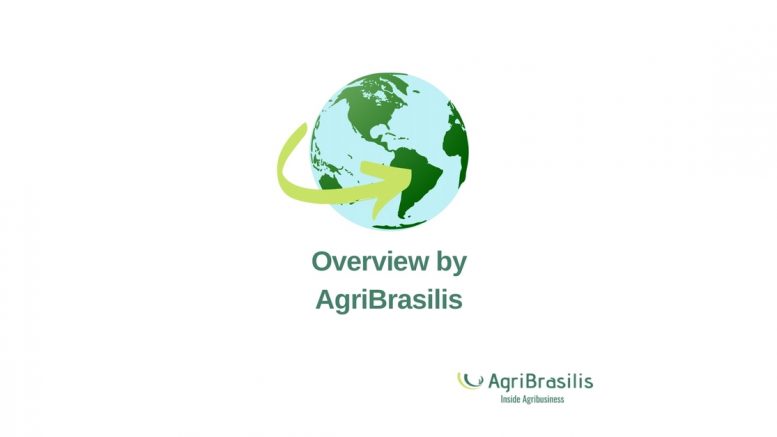Confirmed case of “mad cow disease” in Brazil
National Institute of Agricultural Technology developed a pestici
Water deficit affects 67% of the soybean area, compared to 61% of the previous week. Above-average temperatures continue to hamper the development of crops. (Buenos Aires Grain Exchange)
Drought economic impact could reach US$10.5 billion, according to Julio Calzada, head of economic research at Rosario Stock Exchange. “Argentina might lose US$ 8 billion in exports”, said Calzada. This represents a loss of US$ 3.5 billion for government revenue, undermining the limited levels of foreign exchange reserves. (Rosario Stock Exchange)
2022/23 wheat harvest has ended. Planted area reached 5.9 million hectares, with total production of 12.9 million tonnes. Wheat shipments from Grande Rosario fell 86% in January, as a result of the drought that reduced production by half. (Rosario Stock Exchange)
![]()
BNDES suspends nine rural credit program lines claiming a high level of resource commitment. Small farmers will be the worst affected, since most of the suspended lines are from the Family Farming Strengthening Program. Rural credit release reached approximately US$ 43.3 billion in seven months of the current harvest plan. (BNDES)
President Lula da Silva declared that US$ 83.56 million will be allocated to areas affected by drought in the State of Rio Grande do Sul. The economic loss caused by drought in soybean farms in the region during the 2022/23 harvest was estimated at US$ 5.51 billion. Brazil may not reach the record harvest of over 150 million tonnes, widely expected by the market, if the rains in February are not enough for the partial recovery of the plants. (Federal Government)
BSBIOS and Grupo Madero signed a purchase and sale agreement for used cooking oil. The residual raw material will be for biodiesel production. The contract provides for the collection of 55,000 liters/month. (BSBIOS; Madero Group)
Archer Daniels Midland, Amaggi, Bunge, Cargill and Louis Dreyfus Company have filed for approval at the Administrative Council for Economic Defense to create a joint venture focused on the road transportation of grains. Each of the trading companies will have an equal share of 20% in the new company, that is yet to be named. (ADM; LDC; Amaggi; Bunge; Cargill)
Government of the State of Rio Grande do Sul presented a plan to mitigate the effects of drought in the region. Short, medium and long-term actions include emergency measures to support and assist farmers, structuring actions and a monitoring system. Among the actions are the amnesty of 100% of the debt of the Troca-Troca de Sementes program for family farmers in cities in emergency situations, the creation of an online system for monitoring the drought, the construction of cisterns, etc. (Department of Rural Development – RS)
Beef exports from Brazil to China were temporarily suspended from 02/23, following an official sanitary protocol. Confirmed case of “mad cow disease” (bovine spongiform encephalopathy) in the State of Pará. This is the atypical form of the disease, that appears spontaneously in older animals, having no risk of dissemination to the herd or humans. The embargo is temporary, but with an indefinite duration, defined by China. (Ministry of Agriculture)
Researchers from the University of São Paulo have developed sensors that follow, in real time, the loss of water in crops. (USP)

![]()
The 2022 harvest was one of the worst for citrus. “We haven’t seen something like this for years. It’s the first time I’ve seen people leaving the business…”, says Román Aros, agronomist from Unifrutti, a exporter company. Drought affected the Coquimbo and Valparaíso regions, where production is concentrated, reducing the quality of the fruit. In 2022, only 268.1 thousand tonnes were exported, the lowest amount since 2016. (Asoex)

Recorded 6,515 cases of pesticide poisoning in 2022, compared to 6,159 cases in 2021. A report by the INS indicates that pesticides rank third among the products that most cause intoxication in the country, behind drugs and psychoactive substances. (National Institute of Health)

Tarafert will invest approximately US$ 1.5 billion to build a fertilizer plant in Durango, with the objective of supplying half of the country’s demand for fertilizers. Construction is expected to take three years. (Tarafert)
Federal Commission for the Protection against Sanitary Risks dismissed 11 public servants because of alleged acts of corruption and collusion in the regulation of various substances and products, mainly pesticides. (Cofepris)
Senate must hear the demands of farmers from the Chihuahua region before deciding on reforms in the legislation related to the use of pesticides. (Sader)


Concluded first export of high quality pork to Taiwan. Shipment contains 72 tonnes of pork cuts, including leg, loin, bacon, etc. (Senacsa)

Grape farmers and exporters are looking to recover from nearly two weeks of lockdowns and protests in the country. Part of the exports is being redirected from the Asian continent to closer markets in order to reduce transport times. Some producers have chosen to ship their fruit to Central American markets to ensure that grapes arrive in good quality. (Peruvian Association of Table Grape Farmers)
![]()
Dairy farming might record losses of approximately US$ 100 million because of additional supplementation costs and production decrease. Losses because of supplementation costs are expected to reach from US$ 58 to US$ 65 million/year. Milk production, that is expected to drop by around 5%, represents a loss of approximately US$ 40 million. (Ministry of Agriculture)

READ MORE:

